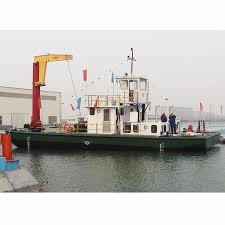The Nigerian Ports Authority (NPA) 2024 Consolidated Management Report paints a vibrant picture of significant growth and enhanced efficiency across the nation’s port operations. The report highlights a surge in activity across various key performance indicators, including cargo throughput, ship traffic, and service boat operations, signifying a robust maritime sector contributing significantly to the national economy. The remarkable progress underscores the impact of infrastructure improvements, operational streamlining, and the emergence of Lekki Deep Seaport as a major driver of efficiency and growth.
A cornerstone of this positive trajectory is the exceptional performance of service boat operations, which experienced a remarkable 49.6% increase in activity. The number of boats handled leaped from 8,956 in 2023 to 13,396 in 2024, reflecting a substantial rise in offshore activities and improved port service infrastructure. This surge was further complemented by a staggering 129.3% increase in gross registered tonnage for service boats, which rose from 1,997,163 tonnes to 4,579,742 tonnes, indicating the increasing size and capacity of vessels operating within Nigerian waters. This dramatic increase signifies not only increased offshore activity, but also the growing capacity of Nigerian ports to accommodate larger vessels and handle a greater volume of maritime traffic.
The report underscores a notable improvement in operational efficiency across Nigerian ports. Average vessel turnaround time, a critical indicator of port efficiency, decreased by 1.0%, dropping from 4.7 days to 4.6 days. This improvement reflects the effectiveness of measures implemented to streamline port operations and reduce vessel waiting times. Leading the charge in efficiency was Lekki Deep Seaport, boasting an impressive average vessel turnaround time of just 2.5 days. Furthermore, berth occupancy rates saw an upward trend, increasing from 30.1% in 2023 to 33% in 2024, signaling increased port utilization and operational effectiveness. This suggests that investments in infrastructure and operational improvements are yielding tangible results, optimizing the use of existing port facilities.
Cargo throughput, a pivotal indicator of trade activity, witnessed a substantial 45.1% surge, soaring from 71,213,197 metric tonnes in 2023 to 103,336,863 metric tonnes in 2024. This significant increase underscores burgeoning trade activities and improved operational efficiencies within the Nigerian port system. Lekki Port emerged as a major catalyst for this growth, registering an astounding 2,160.8% increase in cargo throughput. Other key ports also contributed to this positive trend, with Onne Port recording a 9.4% rise and Tincan Island Port experiencing a 7.3% growth. The composition of cargo reveals that liquid bulk cargo constituted the largest share at 55.6%, followed by containerized cargo at 20.9%. This indicates the importance of Nigeria’s role in the global trade of liquid bulk commodities, as well as the growing significance of containerized trade for the nation’s economy.
Ship traffic also experienced significant growth, with the number of ship calls rising by 5.6% from 3,791 in 2023 to 4,005 in 2024. This increase in vessel visits was accompanied by an even more substantial 15.4% growth in gross registered tonnage (GRT), climbing from 123,660,278 tonnes to 142,660,418 tonnes. This indicates an increase not only in the number of ships calling at Nigerian ports but also in the size and capacity of those vessels. Once again, Lekki Port spearheaded the growth, registering a remarkable 477.6% increase in ship calls, while Onne Port experienced a steady 5.8% rise. These figures underscore the growing importance of Lekki Port as a major hub for maritime activity in the region, and highlight the continued relevance of established ports like Onne.
The growth in ship traffic was mirrored by a significant increase in container throughput, rising by 9.7% to reach 1,744,972 twenty-foot equivalent units (TEUs) in 2024, compared to 1,591,194 TEUs in 2023. Within this category, laden containers saw a 12.2% growth, with export-laden containers experiencing a remarkable 53.7% surge. This demonstrates the positive impact of improved port infrastructure and operational efficiency on facilitating international trade and boosting export activities. Furthermore, transshipment container traffic witnessed an impressive 136.5% increase, signifying the growing role of Nigerian ports as strategic hubs for regional cargo redistribution. This highlights the potential of Nigerian ports to become key players in the West African maritime landscape, serving as gateways for cargo moving throughout the region.














